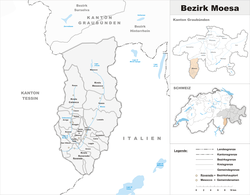Moesa District, often referred to as Moesano, is a former administrative district in the canton of Graubünden, Switzerland. It had an official language of Italian, a population of 8,125 in 2015, and an area of 473.74 km2 (182.91 sq mi), corresponding to the Mesolcina valley along the eponymous Moesa River.
Moesa
Distretto di Moesa | |
|---|---|
District | |
 | |
| Country | |
| Canton | |
| Capital | Roveredo |
| Area | |
| • Total | 473.74 km2 (182.91 sq mi) |
| Population (December 2015) | |
| • Total | 8,125 |
| • Density | 17/km2 (44/sq mi) |
| Time zone | UTC+1 (CET) |
| • Summer (DST) | UTC+2 (CEST) |
| Municipalities | 14 |

On 1 January 2015 the former municipalities of Arvigo, Braggio, Selma and Cauco merged to form the new municipality of Calanca.[1]
The Moesa District was replaced with the Moesa Region on 1 January 2017 as part of a reorganization of the canton.[2]
Municipalities
editIt consisted of three Kreise (circles) and fourteen municipalities:
| Municipality | Population (31 December 2020)[3] | Area (km2) |
|---|---|---|
| Buseno | 91 | 11.26 |
| Calanca | 201 | 37.72 |
| Castaneda | 278 | 3.94 |
| Rossa | 151 | 58.93 |
| Santa Maria in Calanca | 115 | 9.32 |
| Municipality | Population (31 December 2020)[3] |
Area (km2) |
|---|---|---|
| Lostallo | 840 | 50.91 |
| Mesocco | 1,323 | 164.76 |
| Soazza | 324 | 46.37 |
| Municipality | Population (31 December 2020)[3] |
Area (km2) |
|---|---|---|
| Cama | 589 | 15.06 |
| Grono | 1,397 | 14.83 |
| Leggia | 138 | 9.15 |
| Roveredo | 2,597 | 38.78 |
| San Vittore | 864 | 22.03 |
| Verdabbio | 163 | 13.11 |
Languages
editThe official language of Moesa is Italian, traditionally the Western Lombard dialect spoken by the native population.
| Languages | Census 2000 | |
|---|---|---|
| Number | Percent | |
| German | 528 | 7.1% |
| Romansh | 10 | 0.1% |
| Italian | 6,578 | 88.0% |
| TOTAL | 7,471 | 100% |
References
edit- ^ Amtliches Gemeindeverzeichnis der Schweiz published by the Swiss Federal Statistical Office (in German) accessed 2 January 2013
- ^ Swiss Federal Statistical Office - Amtliches Gemeindeverzeichnis der Schweiz - Mutationsmeldungen 2016 accessed 16 February 2017
- ^ a b c "Ständige und nichtständige Wohnbevölkerung nach institutionellen Gliederungen, Geburtsort und Staatsangehörigkeit". bfs.admin.ch (in German). Swiss Federal Statistical Office - STAT-TAB. 31 December 2020. Retrieved 21 September 2021.
46°14′N 9°07′E / 46.233°N 9.117°E